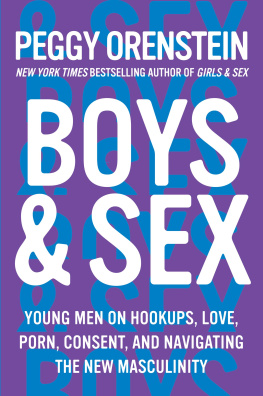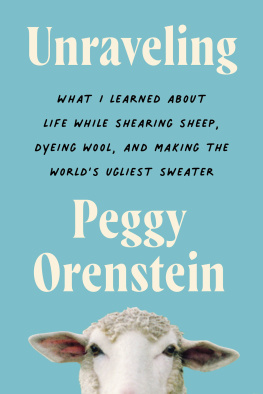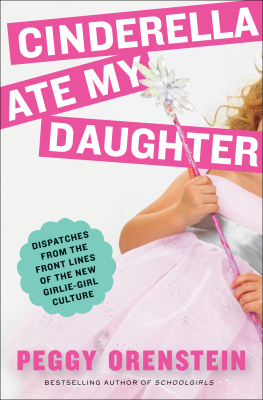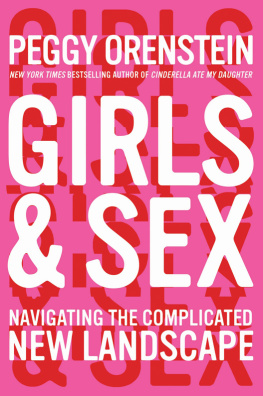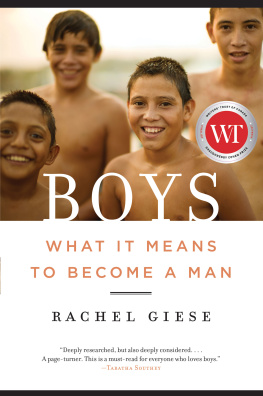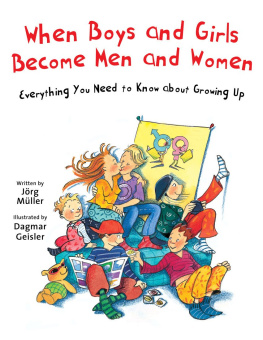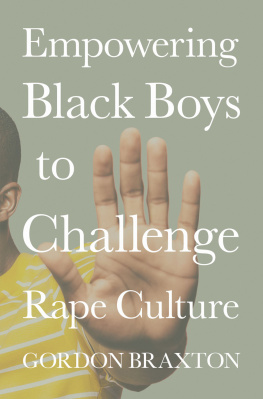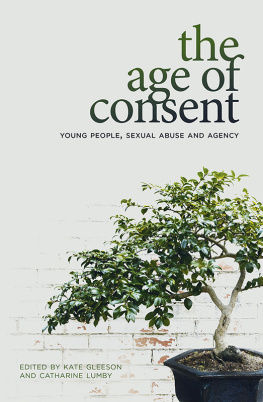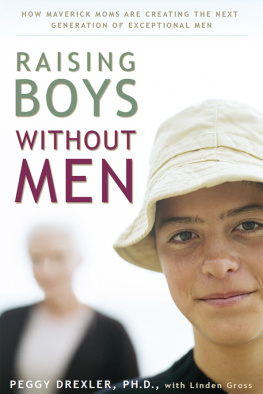TO THE BEST OF MEN:
My husband, Steven Okazaki; my nephews, Matthew Orenstein, Harry Orenstein, and Mike Yamada; my brother-in-law, Geoff Kawafuchi; my big brothers, David and John Orenstein; and my dad, Mel Orenstein
Contents
I never imagined Id write about boys. As a journalist, I have spent a quarter of a century chronicling girls lives. That has been my passion, my calling. But traveling the country in the wake of publishing my book Girls & Sex (which exposed the contradictions young women face in their intimate encounters), I was urged at every stopby parents, by girls, by guys themselvesto turn my attention to young men. Still, I resisted. Girls lives, after all, were the ones that had been transformed by feminism; their parents were the ones driven to demand further change. Our expectations of boys had modified some, but not nearly as much.
Then came #MeToo. And Harvey Weinstein. And Bill Cosby. And Louis C.K. And Kevin Spacey. And Matt Lauer. And Shitty Media Men. And Travis Kalanick. And Roy Moore. And a pussy-grabbing president. And the nude photosharing scandal in the US Marines. And Brock Turner. And Owen Labrie. And, for that matter, Aziz Ansari. And the viral New Yorker story Cat Person. The pervasiveness, the sheer magnitude of sexual misconduct across every sector of society by men young and old became glaringly, disturbingly obvious. Masculinity was declared to be broken and toxic. The parents of boys I met, the ones who when I described my work with girls used to shake their heads ruefully and say they were relieved to have sons, suddenly realized that their job may actually be harder: they had to raise good men. Perhaps, I thought, this moment would be a breakthrough, offering not only a mandate to reduce sexual violence, but an opportunity to engage young men in authentic, long-overdue conversations about gender and intimacy.
Now I was interested, so I did a little digging. I already knew that Americans talk precious little to their daughters about sex, but Id soon learn they talk even less to their sons. True, boys may now more likely be warned to respect women, but what, precisely, does that mean? Which women, under what circumstances, and how? Whats more, despite the growing insistence that only yes means yes, boys (like girls) are bombarded by incessant imageson TV, in movies, games, social media, music videosof female objectification and sexual availability, which are reinforced by unprecedented exposure to pornography. How were they navigating that dissonance? I had read lots of hand-wringing think pieces about boys but heard very little from themtheir own voices were absent from discussions of their behavior in a way that girls, whose activism has pushed social change, were not. Id told a crucial story in talking to young women, but I realized it wasnt enough. If I truly wanted to help promote safer, more enjoyable, more egalitarian, more humane sexual relationships among young people, I needed to go back into their world and have the other half of the conversation.
M Y BIGGEST FEAR when I started my reporting was that guys wouldnt talk to me. Unlike girls, they dont exactly have a reputation for chattiness. Plus, I look like I could be their mom. But if anything, they were more forthcoming, talking extensively, honestly, bluntly, eagerly, includingperhaps especiallyabout the very thing boys are supposedly loath to discuss: their feelings. They confided their insecurities, pressures, and pain; their anxieties about sexual performance; their desire to connect and their fears about doing so. They talked about sexual pleasuretheir own as well as their partners, and when they cared (or didnt) about the latter. They wrestled over the influence of porn; their feelings about casual hookups; how their race, sexuality, and gender identity affected their perceptions of masculinity. They struggled with the social cost of challenging locker room talk. They chafed against the assumption that guys only want sex.
Many of the boys I met treated our sessions as a protected space in which to reflect, to unburden themselves, sometimes to ask if they were normal. Often, they paused during a conversation, drew a deep breath, and said, Ive never told anybody, but... Or, Fuck it, Im just going to tell you this.... That usually preceded an anecdote about a time they toppled from the good guy pedestal, a fall that didnt fitand threatened to underminetheir self-image. Other times they disclosed worrisome high-risk behavior or their own sexual abuse. I was surprised by how raw our conversations could be, but boys so rarely feel permission to speak candidly, from the heart, about their interior lives.
I spent over two years talking to young men between the ages of sixteen and twenty-two, engaging in in-depth, hours-long conversations about masculinity as well as their attitudes, expectations, and early experiences with sex and intimacy. I recruited my subjects through high school teachers, counselors, and college professors Id met while working on Girls & Sex; on campuses where I was asked to speak; and through girls whom Id interviewed over the years. After we met, boys themselves sometimes introduced me to friends or roommates who had differing perspectives. To protect their privacy, I have changed their names and other identifying details.
I do not in these pages claim to reflect the experience of all young men. That would be unrealistic. The girls I wrote about in Girls & Sex were either in college or college bound: to ensure equivalency, so were the boys. The young men of color, in particular, were a distinct group: attending predominantly white schools, conducting their social lives in that world, subject to its specific forms of gendered racism. Also, since my interest lies in the mainstream, I did not wade deep into the muck of the manosphere: I believe, however, that we can learn something about the rage of the incels, MGTOW, Jordan Peterson fans, mass shooters, and other extremists by listening to the ideas, assumptions, and pressures of ordinary boys. Beyond that, though, I cast my net wide, talking to guys from every region of the country, from big cities and small towns, attending both public and private high schools and colleges. They spanned a spectrum of race, religion, and, to a degree, class. They were gay, straight, bisexual, and transgender (an identity I did not explore in Girls & Sex but was more conscious of this round). Although they leaned toward the politically progressive, they were not exclusively so. Many were athletes. Some were in fraternities; some had disaffiliated over the treatment of women by their brothers. Some watched porn daily; a few renounced it entirely. Plenty admitted to having treated girls shabbily. Some acknowledged engaging in sexual misconducteven if they had not, though, they all knew a guy (usually more than one) in high school or college who had: sometimes that person had been a close friend. They grappled with how to demand accountability from those boys, how to take it on themselves.
All in all, I spoke with far more boys than I had girls: well over one hundred. That was, in part, intentionalI wanted to be thorough, given that I hadnt previously written about young menbut it was also significantly easier to obtain permission to talk to them, notably from parents of those who were underage. Maybe adults were simply less protective of their sons, but I suspect some were also hoping that I would not only interview their boys about sexual behavior, but educate them as well, saving parents the awkwardness of doing so themselves.
Would I have gotten a different story from these young men had I been male? I cant say. I came to believe, though, that being a woman had its advantages. I dont know that boys would have been as emotionally open with a man. At the very least, Id say that for anything they withheld because I was female, there was something else they expressed for that precise reason. They often commented on the disconnect between our discussions and the ways theyd learned to talk with other guys about sexual encountersmainly as a means to shore up masculinity. Away from that pressure, they could acknowledge its negative impact on their mental health without seeming weak or feeling judged. Perhaps thats why some young men would

